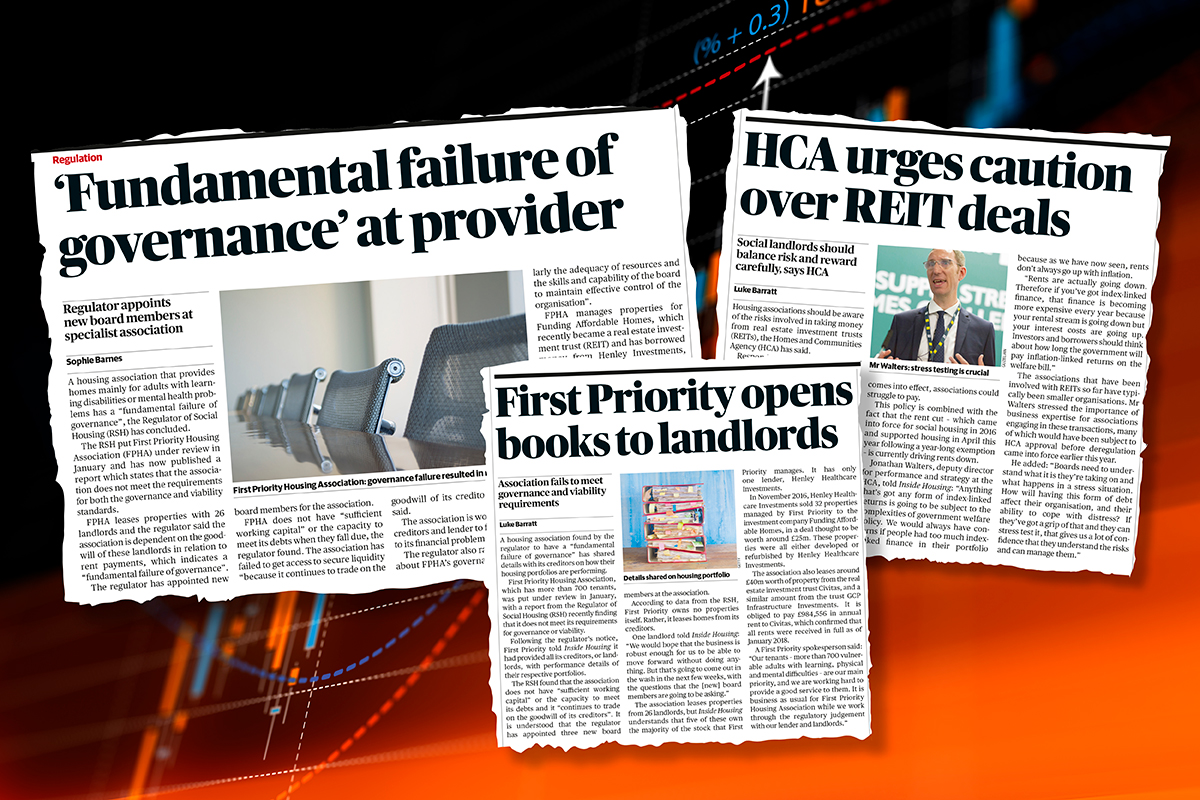You are viewing 1 of your 1 free articles
Lease-based provider entered insolvency process, says RSH
A small lease-based supported housing provider temporarily began insolvency proceedings in May, the Regulator of Social Housing (RSH) has revealed.
Larch Housing Association has today been hit with a regulatory notice for the “serious failure”.
It was previously issued a regulatory notice declaring it non-compliant with the RSH’s governance and financial viability standards in November 2019.
The RSH said that progress at Larch “has been limited” since then and that “significant viability issues remain”.
According to the RSH’s Statistical Data Return, Larch owned or managed 297 homes at March 2019, with 292 classified as “non-social housing”.
The Essex-based association’s business model sees it enter into long-term, index-linked lease arrangements with private firms to acquire homes which it fills with tenants.
Its leases are on “full repairing and insurance” terms, meaning that Larch takes on income collection, maintenance and repair and operating costs risks.
Similarly to concerns outlined by the RSH in November, Larch “continues to be unable to achieve its income forecasts”, placing “significant stress on its cashflow” and leaving it unable to meet its lease obligations “as and when they fall due”, the regulatory notice said.
This situation “has been ongoing for a significant period”, it added, with Larch “currently reliant on the continued support of its head landlords forgoing lease payments in order to continue to trade”.
“In May 2020, creditor action taken against Larch led to the provider entering into the regulator’s insolvency process and the commencement of a moratorium,” according to the notice.
“A combination of subsequent creditor forbearance, and actions taken by the provider, meant that the creditor action was withdrawn. However, this is a serious failure.”
The insolvency processes were therefore halted, giving Larch “a short period to further understand its viability position and to work on restructuring its business plan” – but this breathing space “is reliant on continued forbearance and support of its creditors”.
Larch becomes the second lease-based provider to have entered the regulator’s insolvency process, after creditor action against Westmoreland Supported Housing triggered the proceedings for a short period in July 2019.
Eleven lease-based providers have been declared non-compliant by the RSH since February 2018.
Larch remains non-compliant with governance and viability standards, the RSH said. No regulatory judgement has been issued because Larch has fewer than 1,000 homes.
The association’s board has committed to working with the regulator to address its underlying problems, the RSH said.
A spokesperson for Larch said: “Larch has always strived to provide the highest quality accommodation and housing management services for its tenants who are some of the most vulnerable in society.
“Although we continue to experience cashflow challenges, we are working flat out to resolve them and we currently have the support of our main creditors.
“We also recognise that we have failed to adequately address the regulator’s concerns, therefore we recently recruited a new chair with extensive experience of Larch’s business model and the regulatory framework.
“In addition, we will continue to work constructively with the regulator until we achieve compliance with all the standards.”
An interim regulatory judgement was also issued for Eastlight Community Homes, which was formed through a merger between Colne Housing and Greenfields Community Housing on 1 July.
The Essex-based landlord was given a regulatory rating of G1/V1 – the highest available grades for governance and financial viability.
Emma Palmer, chief executive of Eastlight Community Homes, said: “This interim judgement follows the great work carried out by our people to successfully create Eastlight Community Homes.
“We look forward to working with the regulator as we continue to develop our trailblazing resident-focused Community Gateway Association.”
Update: at 12.32pm, 24/07/20 a comment from Larch was added to the story.
Lease-based providers the regulator has found non-compliant
Regulatory gradings (for providers with more than 1,000 homes):
Prospect Housing (G3/V3 in May 2020)
New Roots (G3/V3 in February 2020)
Westmoreland (G4/V3 in September 2019)
Inclusion (G3/V3 in February 2019)
Sustain (UK) (G3/V2 in January 2019)
Trinity (G3/V3 in November 2018)
Regulatory notices (for providers with fewer than 1,000 homes):
Larch (November 2019)
Expectations (UK) (September 2019)
Bespoke Supportive Tenancies (May 2019)
Encircle (April 2019)
First Priority (February 2018)
Sign up for our legal and regulation newsletter
Already have an account? Click here to manage your newsletters













